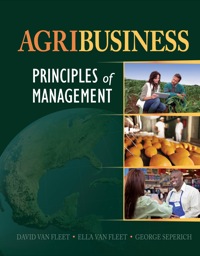Smoking originated in the Americas where tobacco grew wild. Around 46 million Americans are smokers, with men
Question:
Smoking originated in the Americas where tobacco grew wild. Around 46 million Americans are smokers, with men (24.8 million) slightly outnumbering women (21.1 million); and in the United Kingdom there are 20 million smokers. As a result of legislative action, however, smoking is down among minors.
In response to the U.S. government’s eff orts to reduce smoking, in November 1998 the nation’s leading cigarette manufacturer’s signed a contract called the Master Settlement Agreement (MSA) with the attorneys general of 46 states, five U.S. territories, and the District of Columbia. The original tobacco signatories on this agreement were agribusiness firms: Philip Morris Inc., R.J. Reynolds Tobacco Company, Brown & Williamson Tobacco Company, Lorillard Tobacco Company, Liggett Group Inc., and Commonwealth Brands Inc.
In the words of Philip Morris Inc., “The tobacco settlement agreements created fundamental changes in how tobacco products are advertised, marketed, and sold in the United States. The agreements include a variety of restrictions on the sale and marketing of cigarettes, including prohibiting . . . any action, directly or indirectly, targeting youth in the advertising, marketing, and promotion of tobacco products.”
It is estimated that this agreement, also known as the multi-state tobacco settlement, will provide about $246 billion dollars to the states, territories, and District of Columbia over the first 25 years of the agreement. (Note: The agreement requires that the tobacco signatories will continue to make payments to the states in perpetuity.)
Pause for a moment. This one agribusiness industry will pay to the United States, and others close to a quarter of a trillion dollars until 2023 and then continue to pay even after that. This is a significant sum of money and surely must have a great effect on the industry. It will be instructive to see how the industry and government have fared over the past decade. Customers are fewer as the proportion of smokers has shrunk.
Smoking is being banned in eating establishments, government offices, and by many other organizations.
Employees frequently have to exit buildings where they work in order to smoke.
So it seems that the original tobacco signers on the agreement have followed the tenets of the agreement, but others are getting creative about trying to capture a share of the “smoker market.” In the United States, for example, a federal tax loophole offers deep discounts to people who roll their own cigarettes.
However, rolling your own cigarette is self-limiting. It requires skill and experience. Enter technology: some tobacco retailers have installed “Roll-Your-Own Cigarette” machines. These machines produce a carton of cigarettes in eight minutes, and the carton could cost half the price of a branded manufacturer’s carton of cigarettes.
The reason this technology can deliver a carton of cigarettes at half the price has little to do with technology and everything to do with tax regulations. These cigarettes are made with “pipe” tobacco, not cigarette tobacco. Cigarette tobacco carries a federal excise tax of $24.78/pound versus pipe tobacco with a federal excise tax of $2.83/pound. How acceptable is the substitute? One retailer reported a one-hour wait by customers for their turn at the machine.
Not to be outdone by the retailers, the U.S. federal government ruled that retailers featuring these machines must obtain “manufacturing permits and pay applicable federal taxes.” Now these 120 stores must obtain permits from the Treasury’s Alcohol and Tobacco Tax and Trade Bureau, comply with bookkeeping rules, and pay $10.07 federal excise tax per manufactured carton.
QUESTIONS
1. What is the impact of anti-tobacco actions (legislation, education, etc.) on organizations other than those in the tobacco industry?
2. Visit a variety of local businesses and determine what their smoking policies are for employees.
What do your findings suggest?
3. Can, and should, smoking/non-smoking be used as a criterion in hiring? Why or why not?
Step by Step Answer:

Agribusiness Principles Of Management
ISBN: 9781285952352,9781285947839
1st Edition
Authors: David Van Fleet, Ella Van Fleet, George J. Seperich





